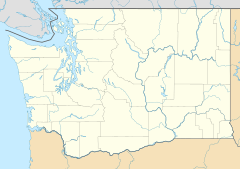Little Boston, Washington facts for kids
Quick facts for kids
Little Boston, Washington
|
|
|---|---|
| Country | United States |
| State | Washington |
| County | Kitsap |
| Elevation | 66 ft (20 m) |
| Time zone | UTC-8 (Pacific (PST)) |
| • Summer (DST) | UTC-7 (PDT) |
| ZIP codes |
98346
|
| GNIS feature ID | 1511101 |
Little Boston is a small community in Kitsap County, Washington, in the United States. It sits on the east side of Port Gamble, which is a bay connected to Hood Canal. Right across the bay is another community called Port Gamble.
Little Boston is part of the Port Gamble Indian Reservation. This reservation is home to the Port Gamble band of the S'Klallam tribe.
The Port Gamble S'Klallam Reservation covers about 1,340 acres (5.4 km²) of land. This land is held in trust by the U.S. government. This means individuals do not own private land there. Most of the land is forest, but there are also homes, businesses, and offices.
The U.S. Census Bureau calls this area the Port Gamble Tribal Community. In 2010, about 916 people lived there.
The reservation gets about 20 inches (508 mm) of rain each year. This is because it is in the "rain shadow" of the Olympic Mountains. The land rises from the beach to gently rolling hills.
Port Gamble Bay is special because it's the last bay in Kitsap County where people can still gather shellfish for business. The S'Klallam Tribe also has a hatchery for fish on Middle Creek. You might also see animals like bears and deer living on the reservation.
Contents
History of Little Boston
Early Life of the S'Klallam Tribe
The S'Klallam tribe has lived in this area for a very long time. In 1848, when the United States organized the Oregon Territory, the S'Klallams had villages on the west side of Port Gamble Bay.
Arrival of the Sawmill
In the summer of 1853, a man named Josiah Keller arrived by ship. He came to build a sawmill for a company called Puget Mill Co. He asked the Native Americans to move across the bay. This would make space for the new mill.
Keller offered them free lumber for their homes and free firewood. He also promised Christmas gifts. The S'Klallams agreed to move.
Working at the Mill
Keller's sawmill became very successful. Many S'Klallam people found jobs working there. Over time, the Puget Mill Co. and other logging companies bought most of the land around Port Gamble Bay.
Treaty and Moving On
The S'Klallams signed a deal called the Point No Point Treaty on January 26, 1855. In this agreement, they gave up their rights to the land. The treaty said the tribe should move to a reservation with another tribe called the Skokomish.
However, most S'Klallams did not want to move. They continued to live off the water and land. They also kept working at the mill.
Life in Old Little Boston
The community of Little Boston was named by a sea captain. It had homes built on a sandy area. These homes stood on stilts because of the tides. Water was brought to the homes through a wooden channel. People used boards to get their share of the water. Toilets were outside, built over the mudflats, and connected by wooden walkways.
Land Ownership Changes
Some S'Klallam individuals bought their own land along the bay. They paid cash or used a special law called the Indian Homestead Act. After the logging companies cut down all the trees, they were not very interested in the land anymore.
However, many of these land titles were lost during the Great Depression. This happened because the owners could not afford to pay county taxes.
Establishing the Reservation
In 1934, the U.S. Government passed the Indian Reorganization Act. This law allowed the government to buy land for reservations. The Department of the Interior bought land from Puget Mill Co.
In 1938, the S'Klallam Reservation was officially created. New homes were built on the reservation for the tribe members.
Notable Residents
- Jeffrey Veregge (1975-2024), a famous S'Klallam artist.
See also
 In Spanish: Little Boston (Washington) para niños
In Spanish: Little Boston (Washington) para niños



